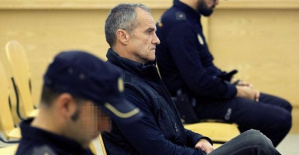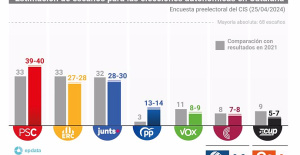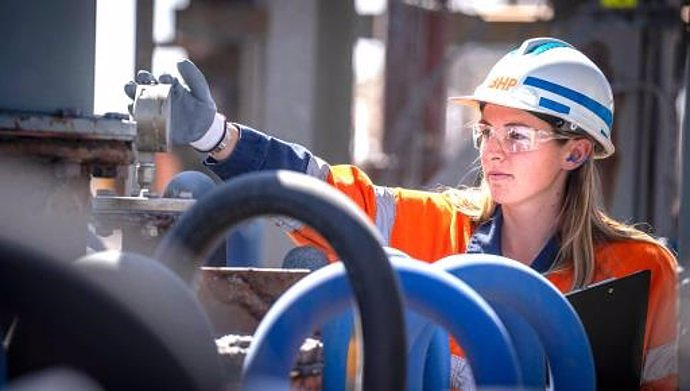Charge against the conservative members for the delay of the CGPJ to appoint its magistrates to the Constitutional
MADRID, 29 Nov. (EUROPA PRESS) -
The Minister of the Presidency, Relations with the Courts and Democratic Memory, Félix Bolaños, has defended the suitability of the two Government candidates for the Constitutional Court --the former minister Juan Carlos Campo and the former director general of the Ministry of the Presidency Laura Díez-- and It has relied on a ruling from the guarantee court itself to appoint its two magistrates without the two that the General Council of the Judiciary (CGPJ) is responsible for appointing.
"We believe that they are two absolutely suitable profiles. Few people have such extensive knowledge of the Administration from different positions," he said at the press conference after the Council of Ministers in which both candidates were approved.
Bolaños has assured that he is "convinced" that they will do their work "with rigor" and "with a vocation for public service." In line, he has criticized the impartiality of the magistrates that the Government has now proposed and has ensured that they have the same suitability as the magistrates that they are going to replace and who were appointed by the previous Executive.
The minister has stressed that Campo is an "accredited person" who "began his career 35 years ago" and who "has served the public in different roles." He has also stressed that he "is a person of dialogue" and "of consensus". "The decision that he makes today is an absolutely suitable decision," he has defended.
Juan Carlos Campo was the Minister of Justice who approved the pardons for those convicted of the independence process in Catalonia and who later returned to the National Court to join the Criminal Chamber, where he has had to refrain from cases with politicians.
Laura Díez Bueso, for her part, is a professor at the University of Barcelona, adviser to the Catalan Government for the reform of the Statute and a former high-ranking position in the Ministry of the Presidency of the Government of Pedro Sánchez.
Although he has an academic profile, his career has turned to politics in recent years and so much so that he has held important positions in the Government of Pedro Sánchez. In fact, since February 2020 --when former Vice President Carmen Calvo appointed her-- and until 2022, she has held the position of General Director of Constitutional Affairs and Legal Coordination of the Ministry of the Presidency, Relations with the Courts and Democratic Memory .
Bolaños has specified that the Executive will send the agreement to the Constitutional Court "so that it can formally verify that they comply with the suitability requirements established by law." Although, in his opinion, Campo and Díez "more than meet" these requirements.
In the framework of his intervention, Bolaños has emphasized a ruling by the Constitutional Court itself that guarantees that the Government names its two candidates without having to wait for the CGPJ.
"There is already a Constitutional ruling, which is from November 15, 2016, where it is said that when a body that has an obligation to appoint Constitutional magistrates does not do so in time and form, that cannot delay another body, in this case the government", he explained.
Now that Moncloa has chosen to move forward without the CGPJ -which also has yet to name the two corresponding magistrates-, the one who must clear up the unknown is the Constitutional Plenary, since it is the one who must give the 'placet' to the selected.
Initially, sources from the court of guarantees saw it difficult for the two candidates for the Executive branch to overcome the filter of the Plenary session without the two from the CGPJ, because -they explained- the Council could not fulfill its constitutional function due to the reform of the Organic Law of the Judiciary approved in March 2021 that prohibited the body from making discretionary appointments in the judicial leadership while it expired, a situation in which it has been going for almost four years.
The same sources, however, have now stressed that the scenario changed last July, when PSOE and Unidas Podemos promoted the approval of a second reform so that the Council would recover its power to fill vacancies in the high courts, although only for the Constitutional Court. .
Faced with this thesis, other sources consulted by Europa Press maintain that the Constitution does not allow any other interpretation than that the renewal be made with the full third (the 4 magistrates), because the opposite would mean 'de facto' doing it by sixths (2 magistrates).
Thus, the key to the plenary session will be held by the current conservative majority of the TC, from 6 to 5, since the position of magistrate Alfredo Montoya --who must fill the Senate-- remains vacant. It should be remembered that, if the Government finally decides to appoint on its own, and obtains the approval of the Plenary, the majority of the Constitutional Court will change because González-Trevijano and Narváez, at the time nominated by the Rajoy Executive, would be replaced by the two sent by the Sánchez Cabinet, configuring a progressive majority of 7 to 4, in the absence of the two from the CGPJ.
Within the framework of the press conference, Bolaños has charged this Tuesday against the conservative members for the delay of the General Council of the Judiciary (CGPJ) to appoint the two magistrates that it corresponds to designate for the Constitutional Court (TC).
"I do not hide from you that we would have wanted these appointments to have been simultaneous to both of the CGPJ. I do not want to refer to the CGPJ in its entirety, but to the eight members who have not complied with the law," he pointed out.
Likewise, Bolaños has assured that "in no case can the breach of the law of the CPGJ imply a breach of the law by the Government." Thus, he has insisted that "the Government asks all political agents to comply with the Constitution."
The Minister of the Presidency has also stressed that the Executive "has the right and has the duty" to make such appointments. "The situation of blockade that is taking place in the CGPJ is a breach that cannot lead to the Government also failing to comply", he pointed out.

 Exploring Cardano: Inner Workings and Advantages of this Cryptocurrency
Exploring Cardano: Inner Workings and Advantages of this Cryptocurrency Seville.- Economy.- Innova.- STSA inaugurates its new painting and sealing hangar in San Pablo, for 18 million
Seville.- Economy.- Innova.- STSA inaugurates its new painting and sealing hangar in San Pablo, for 18 million Innova.- More than 300 volunteers join the Andalucía Compromiso Digital network in one month to facilitate access to ICT
Innova.- More than 300 volunteers join the Andalucía Compromiso Digital network in one month to facilitate access to ICT Innova.-AMP.- Ayesa acquires 51% of Sadiel, which will create new technological engineering products and expand markets
Innova.-AMP.- Ayesa acquires 51% of Sadiel, which will create new technological engineering products and expand markets A Commission created by the CSD will supervise the RFEF
A Commission created by the CSD will supervise the RFEF The AN judge prosecutes the former ETA leader for her responsibility in the kidnapping and murder of Miguel Ángel Blanco
The AN judge prosecutes the former ETA leader for her responsibility in the kidnapping and murder of Miguel Ángel Blanco The European Parliament condemns the contacts of the Catalan independence movement with Russia and demands an investigation
The European Parliament condemns the contacts of the Catalan independence movement with Russia and demands an investigation The PSC would win the Catalan elections with 39-40 seats, Junts would obtain 28-30 and ERC 27-28, according to the CIS
The PSC would win the Catalan elections with 39-40 seats, Junts would obtain 28-30 and ERC 27-28, according to the CIS How Blockchain in being used to shape the future
How Blockchain in being used to shape the future Not just BTC and ETH: Here Are Some More Interesting Coins Worth Focusing on
Not just BTC and ETH: Here Are Some More Interesting Coins Worth Focusing on Retrópolis brings the golden age of video games and computing to the UPV
Retrópolis brings the golden age of video games and computing to the UPV Looking for video games that value the neighborhoods of Valencia
Looking for video games that value the neighborhoods of Valencia UPV researchers improve the efficiency of air conditioning systems using a geothermal heat pump
UPV researchers improve the efficiency of air conditioning systems using a geothermal heat pump València is committed to citiverse and smart tourism to be "the reference technological hub of the Mediterranean"
València is committed to citiverse and smart tourism to be "the reference technological hub of the Mediterranean" A million people demonstrate in France against Macron's pension reform
A million people demonstrate in France against Macron's pension reform Russia launches several missiles against "critical infrastructure" in the city of Zaporizhia
Russia launches several missiles against "critical infrastructure" in the city of Zaporizhia A "procession" remembers the dead of the Calabria shipwreck as bodies continue to wash up on the shore
A "procession" remembers the dead of the Calabria shipwreck as bodies continue to wash up on the shore Prison sentences handed down for three prominent Hong Kong pro-democracy activists
Prison sentences handed down for three prominent Hong Kong pro-democracy activists ETH continues to leave trading platforms, Ethereum balance on exchanges lowest in 3 years
ETH continues to leave trading platforms, Ethereum balance on exchanges lowest in 3 years Investors invest $450 million in Consensys, Ethereum incubator now valued at $7 billion
Investors invest $450 million in Consensys, Ethereum incubator now valued at $7 billion Alchemy Integrates Ethereum L2 Product Starknet to Enhance Web3 Scalability at a Price 100x Lower Than L1 Fees
Alchemy Integrates Ethereum L2 Product Starknet to Enhance Web3 Scalability at a Price 100x Lower Than L1 Fees Mining Report: Bitcoin's Electricity Consumption Declines by 25% in Q1 2022
Mining Report: Bitcoin's Electricity Consumption Declines by 25% in Q1 2022 Oil-to-Bitcoin Mining Firm Crusoe Energy Systems Raised $505 Million
Oil-to-Bitcoin Mining Firm Crusoe Energy Systems Raised $505 Million Microbt reveals the latest Bitcoin mining rigs -- Machines produce up to 126 TH/s with custom 5nm chip design
Microbt reveals the latest Bitcoin mining rigs -- Machines produce up to 126 TH/s with custom 5nm chip design Bitcoin's Mining Difficulty Hits a Lifetime High, With More Than 90% of BTC Supply Issued
Bitcoin's Mining Difficulty Hits a Lifetime High, With More Than 90% of BTC Supply Issued The Biggest Movers are Near, EOS, and RUNE during Friday's Selloff
The Biggest Movers are Near, EOS, and RUNE during Friday's Selloff Global Markets Spooked by a Hawkish Fed and Covid, Stocks and Crypto Gain After Musk Buys Twitter
Global Markets Spooked by a Hawkish Fed and Covid, Stocks and Crypto Gain After Musk Buys Twitter Bitso to offset carbon emissions from the Trading Platform's ERC20, ETH, and BTC Transactions
Bitso to offset carbon emissions from the Trading Platform's ERC20, ETH, and BTC Transactions Draftkings Announces 2022 College Hoops NFT Selection for March Madness
Draftkings Announces 2022 College Hoops NFT Selection for March Madness























